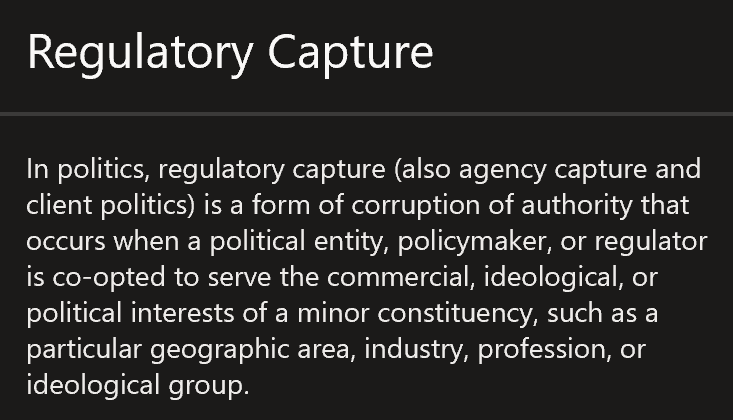Thread
We need to broaden our discussion on #regulatorycapture. The typical understanding is too narrow and based on a faulty understanding of #economy and #regulation as a one-shot game. It's not; the market is a process, and action in it and regulation of it have process implications.
The standard interpretation seems both neutral and innocuous, but it is not. It asserts a certain order of events that has support neither in theory nor empirically: that government agencies are implemented to then be captured/corrupted.
The creation-then-capture logic doesn't hold in what is often called a "repeated game," i.e. in a world where parties can act and react to each other's actions more than once and therefore cause systemic adjustments, adaptations, and even symbiosis.
The standard view also holds, implicitly, that government is good and never itself corrupted or a corruptor of things. In other words, that regulations and agencies are created and basically synonymous with the public good. This is an improper basis, to say the least.
Some agencies/regulations are indeed created politically without external influence. But they are often the result of ideology, political negotiations, logrolling, and are rarely unaffected by lawmakers' attempts to benefit their preferred constituents or organizations (pork).
In other words, even such regulatory efforts that have not (yet) been "captured" are still not unbiased and fully in line with the "public good" (however we want to define it). Bias is, in practice, often a rationale to regulate as well as part of the regulatory process.
The existence of biased rationale is important to understand regulations. This is also where external influence tends to creep in *before* there is regulation or an agency to capture--because of the very nature of regulations and because the economy is a process/a repeated game.
Regulations impose costs on economic actors that also, most often, raise barriers to entry. In other words, regulations create winners and losers. Whoever can survive ("afford") the regulations is implicitly a winner and those who cannot are losers (whether present or future).
Competition for profits therefore makes an incentive for businesses not only to protect themselves from imposed regulations, but also make sure the regulations (1) are not too harmful and (2) harm competitors *more*, which make them a relative gain (and profits always are!).
It makes sense that Walmart and Amazon, incumbents with large market shares and financial muscle, support raising minimum wages even if it's a higher cost--because they can afford it, but present and future competitors most likely cannot. With fewer players, greater market share.
Consequently, these businesses can proactively lobby the government for new regulations, which could benefit them. It means they can influence what regulations are imposed and therefore avoid much of the burden. This is rarely part of the standard view of regulatory capture.
Even the term regulatory capture suggests that it is something that happens *to* regulations and/or regulatory agencies after they have been created. But the truth is that they are often shaped by, and even the result of, such influence. The state becomes a means for competition.
So, when for example the FDA is critiqued for having been "captured" by Big Pharma, the main issue is not, as is sometimes claim, that those corporations finance FDA's certification process. That process was established and shaped by the FDA and Big Pharma together, in cahoots.
This is corruption and the distinction between government and Big Business is increasingly erased. How do we shield society and the economy from this type of corruption? The solution cannot be to strengthen the agencies or increase their financing--the harm is already done.
The core issue is not that a specific regulation/regulatory agency can be captured, which certainly happens, but that such power provides an incentive and means for profit. It is the fact that such power exists, and can be created, that causes these distortions and the "capture."
The discussion on regulatory capture must therefore be broadened to go beyond the issue of capture, albeit important, and analyze the nature of regulations. As I do in "The Seen, the Unseen, and the Unrealized: How Regulations Affect Our Everyday Lives" rowman.com/ISBN/9780739194591/The-Seen-the-Unseen-and-the-Unrealized-How-Regulations-Affect-Our-Every...
